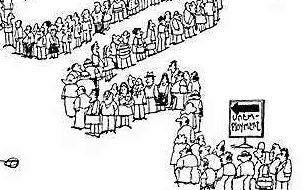One may cite numerous effects causing the dollar's appreciation. Some of those are related to internal dynamics while others are external. Including the US, all news on international level are pessimistic about the future economic development. In return, losing trust, local investors turn to the dollar. Besides, there are foreign liabilities, debt in dollars. Eastern members of the European Union are calling for help but the Western members direct them to the IMF. This caused great disappointment.
Both the IMF and the World Bank revised their forecasts and now predict negative growth in 2009 on global level. This means postponing hopes of growth in 2010.
On national level, every new indicator revealed shows that Turkey's growth in the last quarter of 2008 will be quite low and there will be a dramatic downsizing in 2009, just like the one in 2001. Recently revealed 21 percent decrease in industrial production, coming statistics on unemployment and last quarter economic growth values will further affirm the crisis. All those factors increase the interest in the dollar while downsizing production means incoming dollar figures will lessen. Nonetheless, the private sector is under the obligation to pay debts to foreign creditors and a IMF based solution to all this is not on the government's agenda, which is totally concentrated on the upcoming local elections. Even if a deal is made with the IMF, it's not evident if the incoming capital would be used in this respect. That's why those with an open position are anxious, keeping the demand for the dollar high.
Yet, there's an unexpected factor too. This is about a farce, a cheat. Government's new invention of "property accord" has resulted in an unexpected way of profit. The initiative aimed at gathering the "black dollars" in foreign countries, proposing a covered tax remission with only a 2 percent cut, for those who transfer their money to Turkey. Declaring his/her monetary properties abroad, one would be able to deduce this amount from tax resulting from any investigation on transactions between 2003 and 2007. In short, that 2 percent cut from the money resting abroad would provide firms and persons a distinguished advantage of retrospective capital increase.
This legislation not only gave a way to launder money and legalize them but also provided a chance of avoiding 20-30 percent tax penalty by only paying 2 percent. In result, interest for dollar grew; let's see how:
"Let's declare a couple of millions of dollars and pay a 2 percent cut. In case of a retrospective tax investigation, this would save us." Thinking like that, many firms declared assets that didn't exist. They have to gather these assets by the end of April. This means they need lots of demand for dollars.
It's hard to know how many firms employed this trick but according to hearsay their number is not so low. Even it's said that some chambers of commerce had organized seminars for those who want to benefit from the opportunity.
All in all, it seems like the government had scored an own-goal. Hoping that incoming dollars would lower the demand and cut its valuation, this legislation might have had just the reverse effect.(MS/AGÜ)








